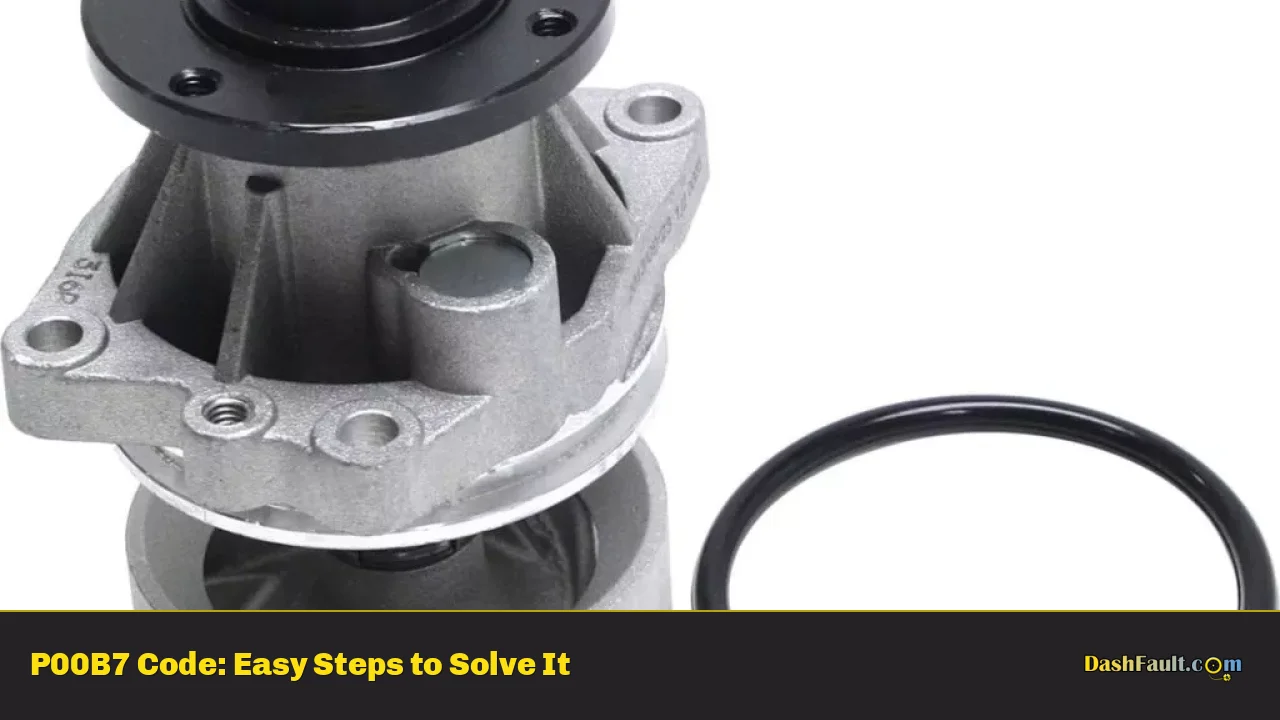The P00B7 trouble code is a diagnostic trouble code (DTC) that indicates an issue with the engine’s coolant flow, specifically categorized as “Engine Coolant Flow Low/Performance.” This code is logged when the powertrain control module (PCM) detects insufficient coolant flow through the cooling system, which could lead to overheating and other performance issues. Understanding this code is crucial for vehicle owners and DIY mechanics, as it can help prevent serious engine damage if addressed promptly.
| P00B7 Code Meaning | P00B7 Code Common Causes |
|---|---|
| Engine Coolant Flow Low/Performance | Low coolant levels |
| Insufficient coolant flow detected by the PCM | Faulty thermostat |
| Potential overheating risk | Defective engine coolant temperature (ECT) sensor |
| Inadequate engine temperature regulation | Faulty radiator coolant temperature sensor |
| Wiring issues or poor connections | |
| Failing powertrain control module (PCM) |
Symptoms of P00B7 Code
When the P00B7 code is present, vehicle owners may notice several symptoms that indicate a problem with the engine’s cooling system:
- Check Engine Light: The most common symptom is the illumination of the check engine light on the dashboard.
- Engine Overheating: Insufficient coolant flow can lead to overheating, which may cause severe engine damage if not addressed.
- Reduced Engine Performance: Drivers may experience a noticeable decrease in power and acceleration due to increased operating temperatures.
- Poor Fuel Efficiency: As engine performance declines, fuel efficiency may also be negatively impacted.
- Low Heater Output: The cabin heater may not provide adequate warmth, indicating issues with coolant circulation.
Technical Explanation of P00B7 Code
The P00B7 code is triggered when there is a significant discrepancy between the readings from the ECT sensor and the radiator coolant temperature sensor. The PCM monitors these sensors to ensure that coolant is flowing properly through the engine and radiator. If it detects a difference greater than a specified threshold (often around 68°F), it concludes that there is insufficient coolant flow, leading to the P00B7 code being stored.
Step-by-Step Diagnosis
Diagnosing the P00B7 code requires a systematic approach:
- Check Coolant Level: Ensure that the coolant level in the reservoir is adequate. Low levels can lead to overheating and insufficient flow.
- Inspect Sensors: Use an OBD-II scanner to retrieve the trouble code and check for any additional codes that may provide further insight into the issue.
- Visual Inspection: Examine wiring and connectors associated with the ECT and radiator temperature sensors for any signs of damage or corrosion.
- Test Thermostat Functionality: Verify that the thermostat opens and closes properly. A stuck thermostat can prevent proper coolant circulation.
- Evaluate Water Pump Operation: Check for leaks or signs of failure in the water pump, which is critical for maintaining proper coolant flow.
- Check for Blockages: Inspect the cooling system for clogs or restrictions that could impede coolant flow.
Solution Methods
To resolve the P00B7 code, consider implementing one or more of the following solutions:
- Top Up Coolant: If low coolant levels are detected, refill to the manufacturer’s recommended level.
- Replace Faulty Sensors: If either the ECT or radiator temperature sensor is found to be defective, replace them immediately.
- Thermostat Replacement: If diagnosed as faulty, replace the thermostat to ensure proper operation.
- Water Pump Repair/Replacement: If leaks or failure are evident in the water pump, repair or replace it as necessary.
- Wiring Repairs: Fix any damaged wiring or poor connections related to the cooling system sensors.
- PCM Reprogramming/Replacement: In rare cases where all other components are functioning correctly, consider reprogramming or replacing the PCM if it is determined to be faulty.
Cost Estimates
The cost of repairs associated with the P00B7 code can vary significantly based on several factors including vehicle make and model, labor rates in your region, and parts prices:
- Coolant Top-Up: $10 – $30
- ECT Sensor Replacement: $50 – $150 (parts and labor)
- Radiator Temperature Sensor Replacement: $50 – $150 (parts and labor)
- Thermostat Replacement: $100 – $300 (parts and labor)
- Water Pump Replacement: $300 – $800 (parts and labor)
- PCM Reprogramming/Replacement: $200 – $1,000+ depending on vehicle type
Warnings and Recommendations
- Always address any symptoms associated with overheating promptly to prevent severe engine damage.
- If you are not confident in your ability to diagnose or repair these issues, seek professional assistance from a certified mechanic.
- Ensure that you use OEM parts where possible for reliability and compatibility with your vehicle’s systems.
Frequently Asked Questions About P00B7
- What does error code P00B7 mean?
The P00B7 code indicates low performance in engine coolant flow, potentially leading to overheating. - How serious is a P00B7 code?
This code should be addressed urgently as it can lead to significant engine damage if left unresolved. - Can I drive my car with a P00B7 code?
It’s not advisable; driving can exacerbate overheating issues. - What tools do I need to diagnose P00B7?
An OBD-II scanner, digital volt/ohmmeter (DVOM), and infrared thermometer are useful for diagnosis. - Is replacing parts always necessary for P00B7?
No; sometimes simple repairs like reconnecting loose wires can resolve this issue. - How can I prevent P00B7 from occurring?
Regular maintenance of your cooling system can help prevent this trouble code. - What should I do if I cleared the code but it returns?
If it returns after clearing, further diagnosis of cooling system components is needed. - Can low coolant cause a P00B7 code?
Yes; low coolant levels are one of the primary causes of this trouble code.
In conclusion, understanding and addressing the P00B7 trouble code is essential for maintaining your vehicle’s performance and preventing potential engine damage. By following systematic diagnostic steps and implementing appropriate solutions, vehicle owners can effectively manage this issue. Always prioritize safety by seeking professional help when necessary.
